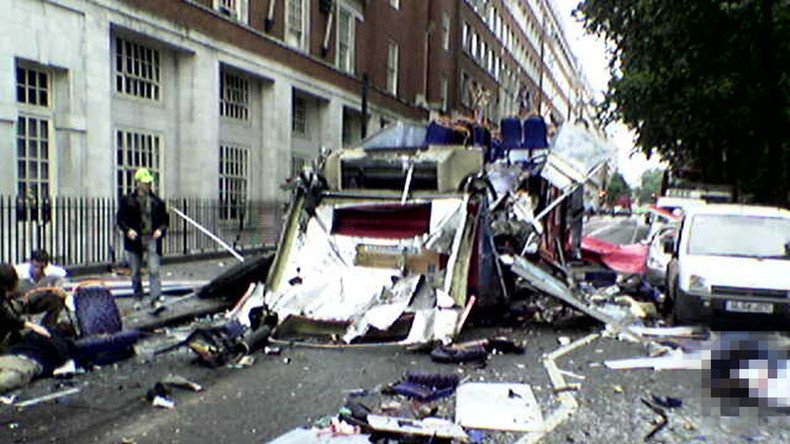7/7 London bombings, 11yrs on: Iraq War raised terror threat, Chilcot suggests

Eleven years on from the London bombings of July 7, 2005, the Chilcot report appears to support longstanding claims that the 2003 Iraq invasion increased the risk of terrorist attacks on the UK.
The long-delayed inquiry into the Iraq War appears to have broadly accepted the contributions made by Iraq-era head of MI5 Eliza Manningham-Buller during the investigation.
Asked whether Iraq increased the risk of terrorism, she told the panel: “I think we can produce evidence because of the numerical evidence of the number of plots, the number of leads, the number of people identified, and the correlation of that to Iraq and statements of people as to why they were involved … So I think the answer to your … question [is]: yes.”
Today marks the 11th anniversary of the 7/7 London bombings that took the lives of 52 people and injured over 700 pic.twitter.com/h9sB0GqFId
— Jeremy Corbyn MP (@jeremycorbyn) July 7, 2016
She also said that by “2003/4 we were receiving an increasing number of leads to terrorist activity from within the UK.”
“Our involvement in Iraq radicalized, for want of a better word … a few among a generation … [who] saw our involvement in Iraq, on top of our involvement in Afghanistan, as being an attack on Islam.”
Today we remember the 52 lives lost during the 7/7 London Bombings. We must never forget them.
— Tim Farron (@timfarron) July 7, 2016
Thursday saw a number of commemorative events take place around the British capital to mark the 2005 terror attack.
London’s first Muslim mayor, Sadiq Khan, attended a ceremony at Hyde Park’s 7/7 memorial, where he told those assembled “my first priority is to do everything possible to prevent a tragedy like this from happening again.”
11 years on, we must never forget those who lost their lives on 7/7, and the unity we showed as Londoners. pic.twitter.com/FDrE4foWVO
— Sadiq Khan (@SadiqKhan) July 7, 2016
“By strengthening the bonds between Londoners from different backgrounds and focusing on real neighborhood policing, we are making it easier for people to speak out and help root out and prevent radicalization and extremism,” he said.
7/7 attacks
On July 7, 2005, Islamist suicide bombers killed 52 people on London’s transport network by detonating devices on the Underground and a London bus.
Shortly before 9am, three suicide bombers detonated explosives on the subway network in quick succession.
These were followed, an hour later, by another explosion in Tavistock Square, which tore through an iconic red London bus.
Last year, on the 10th anniversary of the attacks, RT interviewed those caught up in the bombings and the investigation that followed.
David Vidicette, a Metropolitan Police anti-terrorism officer, found himself thrust into the center of the most savage terror attack in modern British history. After assisting in the search for evidence around the bus blast, which involved lines of officers meticulously combing the circumference of the blast area, picking up every tiny fragment of debris, Vidicette headed back to Scotland Yard.
“We were swamped with more than 50,000 exhibits. There was so much information and there were so many avenues. It took over five years of my life – I know I gave the best that I could have given,” Vidicette told RT’s Joe Glenton.
‘I thought I was dying’
Also speaking to RT a decade on, 7/7 survivor Emmy Georgiou described an “extraordinarily packed” Piccadilly Line train from Oakwood station on her way to work.
Idly reading to pass the time, Georgiou had little clue she was a mere carriage and a half away from 19-year-old suicide bomber Germaine Lindsay.
When the train left Russell Square heading for Kings Cross, Georgiou describes hearing a loud bang and the train plunging “into complete darkness.”
“It was like a vacuum, that’s all you could hear. It was a really large swoosh noise that ran through the carriage,” she told RT. “I thought I was dying.”
“One thing I knew for sure, that this was definitely a terrorist attack,” she added.
Aftermath
Georgiou said she “doesn’t hate” her attacker, Lindsay, but she “can’t believe a 19-year-old child would do that, there was something lacking in his life.”
“If I were to ever meet him, I would ask him what made him become that person, how did he become that man, what happened to him in his life that made him want to hurt people.”
For Vidicette, who has since fictionalized his experiences in his book ‘The Theseus Paradox’, initiatives like the Investigatory Powers Bill, known to its critics as the “snoopers’ charter,” are a price worth paying for security in a post-7/7 Britain.












